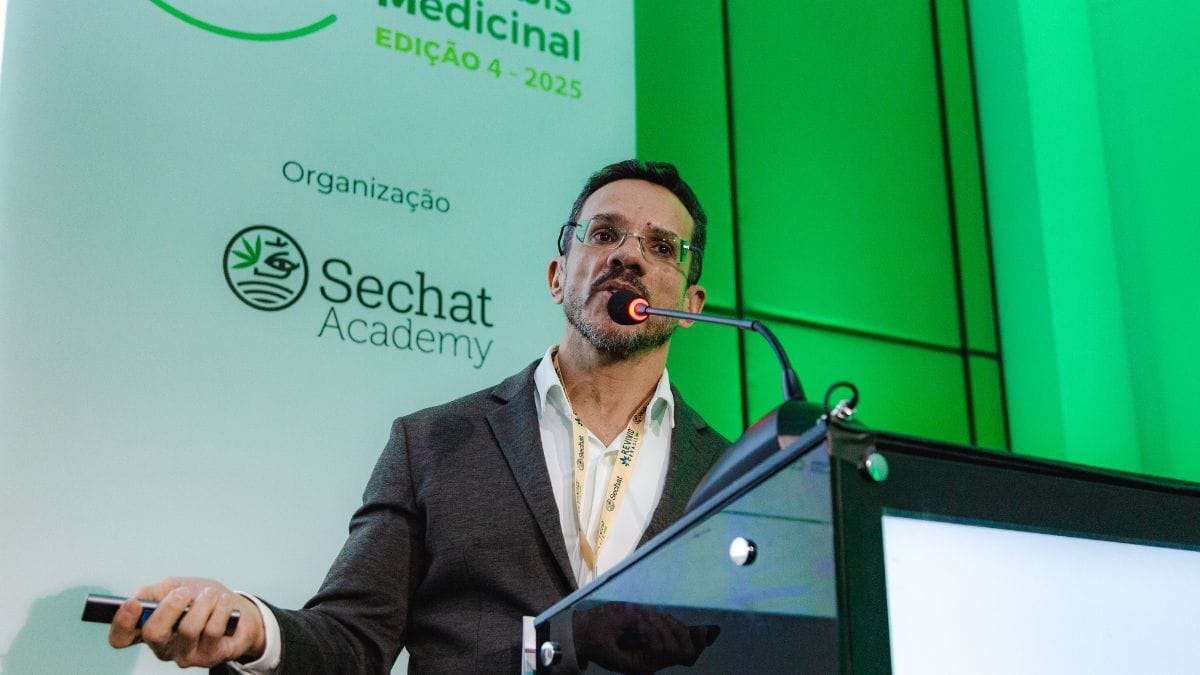Número de médicos prescritores de cannabis cresce e ultrapassa 52 mil no Brasil
Em um ano, país registra aumento de quase 12 mil médicos habilitados e crescimento de 50% nas prescrições de cannabis medicinal
Publicada em 08/09/2025

Dr. Cristiano Fernandes durante o Congresso Brasileiro da Cannabis Medicinal 2025
Em constante expansão, o setor da cannabis medicinal desperta atenção crescente dos profissionais de saúde. Dados da Close-UP indicam que, em março de 2025, o número de médicos prescritores de cannabis nas farmácias atingiu 52,3 mil — quase 12 mil a mais que no mesmo período de 2024. Já as prescrições, físicas ou digitais, aumentaram quase 50%, passando de 228 mil para 338 mil.
Para Cristiano Fernandes, médico hematologista com mais de 16 anos de atuação no Centro de Combate ao Câncer, este é o momento de reintegrar a cannabis à prática clínica. “Há muito tempo tiramos a cannabis do ornamento médico. Trazer de volta esse recurso, agora com conhecimento científico, foco em evidências e qualidade, faz muito sentido e dialoga com a medicina atual”, afirmou.
Ele reforça que os médicos não precisam temer a prescrição de produtos à base de canabinoides, "só é preciso conhecer e saber como utilizar. Precisamos voltar a paquerar e perder o ranço com a cannabis. Não podemos brigar com a ciência”, finalizou.
Confira a fala do Dr. Cristiano:
Benefícios da cannabis na oncologia
A oncologia, campo de grande importância, tem visto na planta uma aliada no manejo de sintomas que comprometem a qualidade de vida dos pacientes. Derivados da cannabis, como o canabidiol (CBD) e o tetrahidrocanabinol (THC), vêm sendo estudados por seu potencial em reduzir dores crônicas, náuseas e vômitos provocados pela quimioterapia.
Além disso, os canabinoides podem auxiliar no estímulo do apetite e na melhora do sono. Esses efeitos, já reconhecidos em diversos países, contribuem para que pacientes enfrentem o tratamento de forma menos desgastante.
Evidências clínicas sobre náuseas e vômitos
Um ensaio clínico randomizado de fase II/III demonstrou que cápsulas contendo THC 2,5 mg + CBD 2,5 mg, administradas de um dia antes até cinco dias após a quimioterapia, aumentaram significativamente a taxa de resposta completa — ausência de vômitos e náuseas — de 8% no grupo placebo para 24% no grupo que recebeu THC:CBD (diferença de 16%, p = 0,01).
Esse resultado indica que a combinação de canabinoides pode ser um complemento eficaz ao tratamento antiemético padrão.
Manejo da dor oncológica
Estudos também investigam a eficácia da cannabis no controle da dor em pacientes com câncer. Uma revisão integrativa de ensaios clínicos randomizados encontrou resultados mistos: enquanto quatro estudos indicaram redução da intensidade e percepção da dor, outros não observaram diferença significativa em relação a placebos ou tratamentos convencionais.
Alguns extratos, como o nabiximol (combinação de THC e CBD), já são usados como adjuvantes, embora ainda sem evidência clara de superioridade.
Potencial antitumoral em pesquisas pré-clínicas
No âmbito laboratorial, pesquisas sugerem que o CBD pode apresentar ação antitumoral: induz apoptose, interrompe o ciclo celular, inibe angiogênese, reduz potencial metastático e afeta a membrana mitocondrial de células cancerígenas. Esses efeitos foram observados em linhagens de câncer de pulmão, mama, ovário, glioma, gástrico e próstata.











